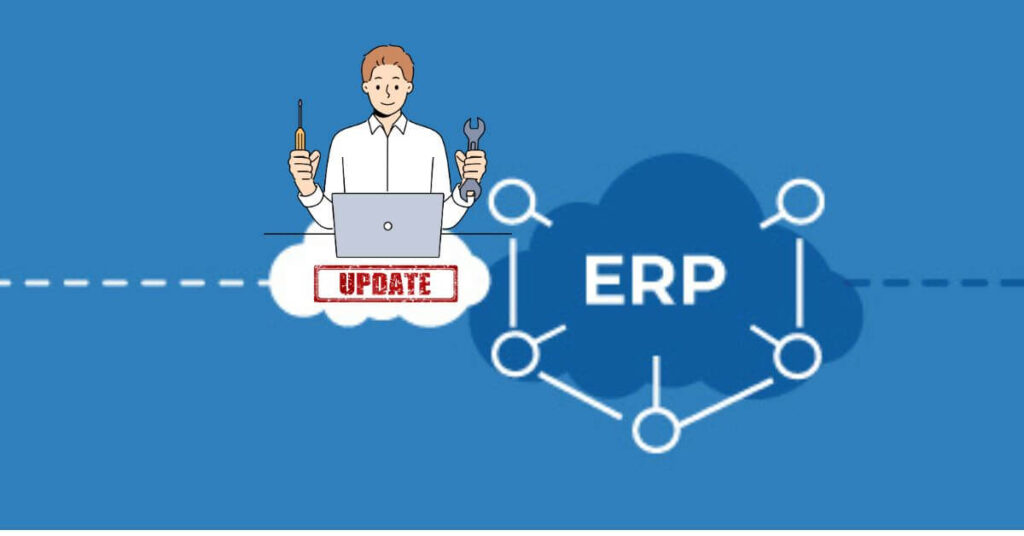ERP system need an upgrade – Have you noticed that your current enterprise resource planning (ERP) software is running slower or less efficiently than before, or are you facing issues with your existing processes or data management? This may be a sign that an upgrade to your ERP is necessary. A fresh start with an updated ERP system can help get your business back on track, make you more efficient, and help you deliver more orders .
Initially, you invested in an ERP system to increase your productivity . However, if your current ERP system is no longer able to improve your productivity, it is time to consider investing in a new solution. As with any other software, ERP software can become outdated and no longer meet your needs. Over the years, your business has grown and evolved, and the system you invested in several years ago may no longer be suited to your current business or operational needs.
Does your ERP system need an upgrade?
Over time, you’ve probably become accustomed to the quirks and quirks of your ERP system. However, without you realizing it, these eccentricities are likely preventing you from responding effectively to customer requests and hampering your business. An ERP should help you in your activities and make your daily life easier, not complicate it.
If your current ERP is hindering you more than it is helping you, you should consider moving to a new system to improve your operational efficiency. At the very least, your ERP system should support your business and help you evolve and achieve your business goals – not hold you back.
Although you may be tempted not to invest in a new system due to the associated costs and inconveniences of implementation , it is important to remember that failing to keep up with new advances and having a system which is no longer suited to your production activity will slow down the growth of your business. Upgrading to the right ERP system is a long-term investment that will pay off in improved operational efficiencies, increased productivity and the ability to remain competitive. Additionally, this new system will save you money over time.
8 signs your current ERP system is outdated
Lack of updates: If your ERP software no longer receives updates even though it works every day, it becomes obsolete. Although the software may still work for you, the lack of new updates from your provider indicates that it will soon be obsolete and no longer supported by your provider. Likewise, if it’s impossible to install ERP on newly acquired hardware, such as a new laptop, that’s a sign that you need a more modern ERP system.
Poor integrations: Your ERP system must be able to integrate easily with other software systems. Otherwise, it’s another sign that it’s outdated and you’re ready for an upgrade. In reality, the world of manufacturing is increasingly connected, which is why the ERP system must integrate easily with other software solutions you use within your business. Most legacy ERP software does not have an integration framework, which will prevent you from customizing your system according to your needs and business expansion.
Workarounds: If you find yourself increasingly resorting to workarounds to make your outdated ERP system work the way you need it to – just like you did before implementing an ERP system – , this is a sign that your system is having difficulty adapting to the changing needs of your business. An abundance of workarounds means you’re ready for new ERP technology that can better support your business operations.
Manual Data Entry: ERP systems are designed in a way to eliminate manual data entry and save you time. If you find yourself having to enter data manually repeatedly due to system limitations, you are ready to upgrade to a new, more robust system that will allow you to streamline your processes.
Poor functionality: The frequency of software updates and releases varies depending on your provider. You may have access to new features and system updates frequently… or not. In other words, some suppliers are better than others at keeping up with market developments. If your ERP is lagging and doesn’t have the features you need, it’s time to consider better solutions from another vendor.
Lack of standard features: If your current ERP system is lacking features that are now considered standard in your industry or are included in modern ERP systems, an upgrade is in order. For example, an upgrade is necessary if your current ERP does not have sufficient reporting and data analysis functions to meet current business requirements.
Limited scalability: Your ERP system must be able to support the future growth of your business . If not, it is essential to upgrade to a more powerful and flexible ERP.
Lack of mobile compatibility: Your ERP system must offer mobile access for certain features, regardless of your location. Mobile compatibility is made necessary because it allows you to make decisions on the go and gives you real-time access to data. This allows you to stay informed about operations even when you are not on site. If your ERP does not have this necessary new functionality, you should look for a more advanced system.
If all of this resonates with you, it’s time to consider investing in a new, modern ERP solution, designed to fit your industry and your needs. If you agreed with even a few points mentioned in this article, don’t hesitate to contact us to learn more about how to find the ERP solution that will meet your specific needs and scale your business.

Pradeep Sharma is a author the mind behind Techjustify, where I craft insightful blogs on technology, digital tools, gaming, AI, and beyond. With years of experience in digital marketing and a passion for tech innovation, I aim to simplify complex topics for readers worldwide.
My mission is to empower individuals with practical knowledge and up-to-date insights, helping them make informed decisions in the ever-evolving digital landscape.


